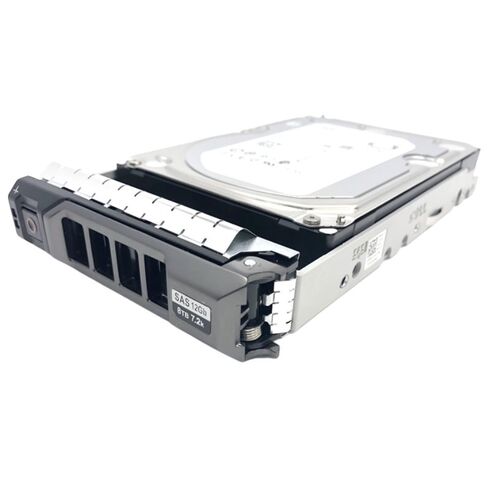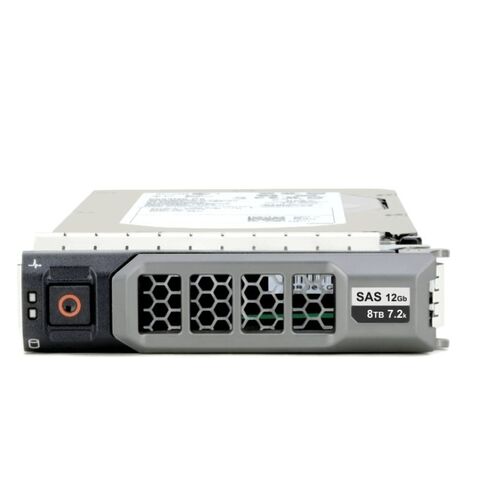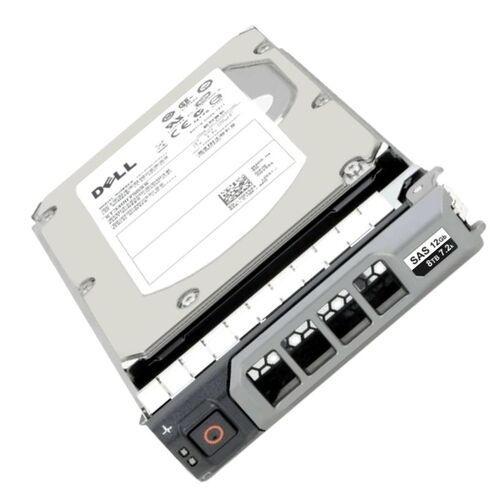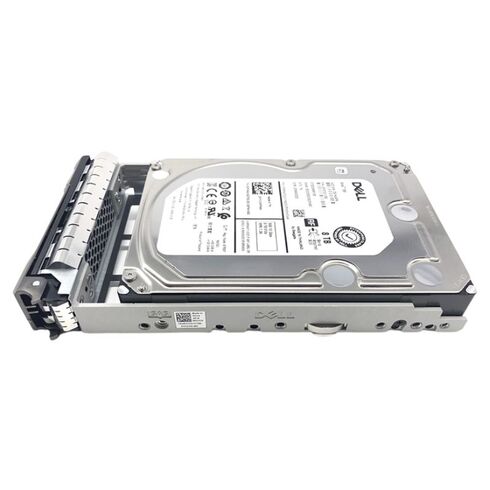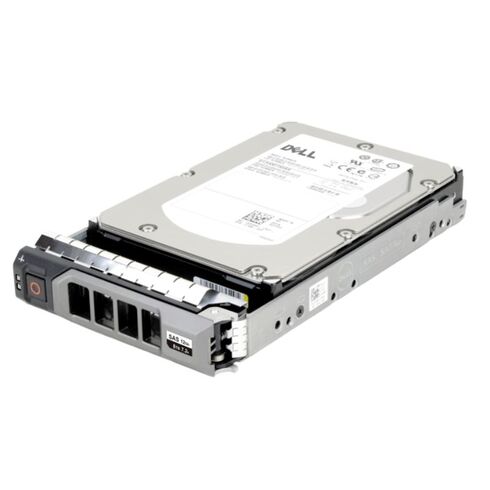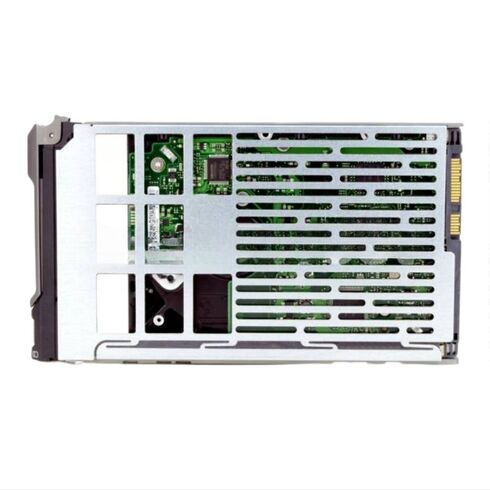463-7471 Dell 8TB 7.2K RPM SAS 12GBPS 512E LFF Hard Drive
- — Free Ground Shipping
- — Min. 6-month Replacement Warranty
- — Genuine/Authentic Products
- — Easy Return and Exchange
- — Different Payment Methods
- — Best Price
- — We Guarantee Price Matching
- — Tax-Exempt Facilities
- — 24/7 Live Chat, Phone Support
- — Visa, MasterCard, Discover, and Amex
- — JCB, Diners Club, UnionPay
- — PayPal, ACH/Bank Transfer (11% Off)
- — Apple Pay, Amazon Pay, Google Pay
- — Buy Now, Pay Later - Affirm, Afterpay
- — GOV/EDU/Institutions PO's Accepted
- — Invoices
- — Deliver Anywhere
- — Express Delivery in the USA and Worldwide
- — Ship to -APO -FPO
- — For USA - Free Ground Shipping
- — Worldwide - from $30
Product Overview of DELL 463-7471 Hard Drive
General Specifications
- Manufacturer Part Number: Dell Part: 463-7471
- Device Type: Hot-swap Hard Drive - Nearline
- Storage Capacity: 8 TB
- Form Factor: 3.5 Inches
- Interface Type: SAS 12Gbps
- Data Transfer Rate: 1.2 Gbps
- Bytes Per Sector: Advanced Format 512e
Performance Metrics
- Spindle Speed: 7200 RPM
- External Drive Transfer Rate: 1.2 Gbps
Expansion and Connectivity Features
- Interfaces: 1 x SAS 12 Gb/s
- Compatible Bays: 1 x Hot-swap - 3.5 Inches
Compatibility
The DELL 463-7471 hard drive is engineered for seamless integration with a wide array of PowerEdge and PowerVault servers, making it an essential component for efficient data management. The following systems are compatible:
- PowerEdge R430
- PowerEdge R530
- PowerEdge R730
- PowerEdge T430
- PowerEdge T630
- PowerEdge R210
- PowerEdge R310
- PowerEdge R320
- PowerEdge R410
- PowerEdge R415
- PowerEdge R420
- PowerEdge R510
- PowerEdge R515
- PowerEdge R520
- PowerEdge R710
- PowerEdge R720
- PowerEdge R720xd
- PowerEdge T310
- PowerEdge T320
- PowerEdge T410
- PowerEdge T420
- PowerEdge T610
- PowerEdge T620
- PowerEdge T710
- PowerVault DL2200
- PowerVault MD1200
- PowerVault MD3200
- PowerVault MD3200i
- PowerVault MD3600f
- PowerVault MD3600i
- PowerVault NX200
- PowerVault NX300
- PowerVault NX3000
- PowerVault NX3100
Key Advantages
This robust hard drive offers several benefits:
- Generous 8 TB storage capacity for extensive data requirements.
- Hot-swap feature allows for quick replacements without system downtime.
- Nearline performance optimizes data access for efficient operations.
- Designed for use in demanding server environments, ensuring reliability and speed.
Capacity
The Dell 8TB 7.2K RPM SAS 12GBPS 512E LFF Hard Drive is equipped with an impressive capacity of 8TB. This massive storage space allows users to store a vast amount of data, making it ideal for businesses and individuals who require high-capacity storage solutions.
Benefits of 8TB Capacity
1. Ample Space for Data Storage: With 8TB of storage, users can store large files, such as high-definition videos, extensive databases, and complex applications. It provides the flexibility to handle increasing data storage needs without worrying about running out of space.
2. Streamlined Workflow: The ample capacity enables users to keep all their important files in one place. This eliminates the need for multiple hard drives or external storage devices, simplifying the workflow and improving productivity.
3. Enhanced Backup Solutions: The large capacity allows for efficient backup solutions. Users can create regular backups of critical data without the need for additional storage resources. This ensures that important information is protected and can be easily restored in case of any unforeseen events.
4. Scalability: As businesses grow, their data storage requirements also increase. The 8TB capacity provides room for future expansion, allowing users to scale their storage infrastructure without the need for immediate upgrades or replacements.
Importance of 8TB Capacity
1. Data Intensive Applications: Businesses dealing with data-intensive applications, such as multimedia production or scientific research, require significant storage space to handle the large volumes of data generated. The 8TB capacity ensures that these applications can run smoothly without any compromises.
2. Data Retention Compliance: Certain industries, such as healthcare and finance, have strict regulations regarding data retention. The 8TB capacity enables organizations in these sectors to comply with regulatory requirements by securely storing large volumes of data over extended periods.
3. Data Analysis and Big Data: With the growing importance of data analysis and big data, organizations need storage solutions that can handle massive datasets. The 8TB capacity provides the necessary space to store and process these large datasets, facilitating advanced analytics and insights.
Conclusion
In conclusion, the 8TB capacity of the Dell 8TB 7.2K RPM SAS 12GBPS 512E LFF Hard Drive offers users a multitude of benefits. From ample space for data storage to streamlined workflows and enhanced backup solutions, this high-capacity hard drive is an excellent choice for businesses and individuals with demanding storage requirements.
Rotation Speed
The Dell 8TB 7.2K RPM SAS 12GBPS 512E LFF Hard Drive boasts a rotation speed of 7.2K RPM, which significantly impacts its performance and usability. The rotation speed plays a vital role in determining how quickly the hard drive can access and retrieve data, making it a critical feature to consider when choosing a storage solution.
Benefits of 7.2K RPM Rotation Speed
1. Faster Data Access: The higher rotation speed enables faster data access and retrieval times. This is particularly important for applications that require quick access to large amounts of data, such as databases or multimedia editing software. Users will experience improved performance and reduced loading times.
2. Seamless Multitasking: The faster rotation speed allows for smoother multitasking capabilities. Users can simultaneously access multiple files or applications without experiencing significant delays or performance bottlenecks. This enhances productivity and workflow efficiency.
3. Enhanced System Performance: The 7.2K RPM rotation speed contributes to overall system performance by reducing the time required for data transfers between the hard drive and other system components. This results in faster boot times, quicker application launches, and improved system responsiveness.
4. Support for High-Bandwidth Applications: Certain applications, such as video editing or gaming, require high bandwidth to handle large file sizes and data streams. The 7.2K RPM rotation speed ensures that the hard drive can keep up with the demands of these high-bandwidth applications, providing a smooth and uninterrupted experience.
Importance of 7.2K RPM Rotation Speed
1. Server Performance: In server environments where multiple users access data simultaneously, the rotation speed becomes crucial in maintaining optimal performance. The 7.2K RPM rotation speed ensures that data can be accessed quickly, minimizing any potential latency issues and ensuring smooth operation.
2. Reduced Data Transfer Times: For organizations dealing with large datasets or frequently transferring files between systems, a higher rotation speed significantly reduces data transfer times. This enables faster backups, restores, and data migrations, saving valuable time and increasing productivity.
3. Improved Gaming Experience: Gamers often require fast storage solutions to load games quickly and reduce in-game loading times. The 7.2K RPM rotation speed ensures that game files are accessed rapidly, providing a seamless gaming experience without frustrating delays.
Conclusion
In summary, the 7.2K RPM rotation speed of the Dell 8TB 7.2K RPM SAS 12GBPS 512E LFF Hard Drive is a crucial feature that offers numerous benefits for users. From faster data access and seamless multitasking to improved system performance and support for high-bandwidth applications, this hard drive is designed to provide an exceptional user experience.
Interface
The Dell 8TB 7.2K RPM SAS 12GBPS 512E LFF Hard Drive features a SAS 12GBPS interface, which plays a vital role in connecting the hard drive to the system and facilitating high-speed data transfers. The interface is a key consideration when choosing a hard drive as it determines compatibility and performance capabilities.
Benefits of SAS 12GBPS Interface
1. Increased Data Transfer Speeds: The SAS 12GBPS interface offers significantly faster data transfer speeds compared to older interfaces like SATA. This allows for rapid data transmission between the hard drive and the system, resulting in improved overall performance and reduced waiting times.
2. Scalability and Compatibility: The SAS interface allows for easy scalability and compatibility with various systems. It supports a wide range of devices, including servers, workstations, and storage arrays, making it an ideal choice for businesses that require flexible storage solutions.
3. Enhanced Redundancy and Reliability: The SAS interface supports advanced features such as redundant paths and multipath I/O, which enhance data redundancy and reliability. These features ensure that data remains accessible even if a single path fails, reducing the risk of data loss or system downtime.
4. Hot-Swapping Capability: The SAS interface enables hot-swapping, allowing users to replace or add hard drives without shutting down the system. This feature is particularly valuable in enterprise environments where continuous operation is critical.
Importance of SAS 12GBPS Interface
1. Enterprise-Class Performance: The SAS 12GBPS interface is commonly used in enterprise environments where high-performance storage solutions are required. It provides the necessary bandwidth to handle demanding workloads, ensuring optimal performance for critical applications and databases.
2. Storage Area Networks (SANs): SANs are widely used in business settings to centralize storage resources and provide shared access to data. The SAS interface is often utilized in SAN deployments due to its high-speed capabilities, enabling efficient data transmission between storage devices and servers.
3. RAID Configurations: For organizations implementing RAID (Redundant Array of Independent Disks) configurations for data redundancy and improved performance, the SAS interface offers the necessary throughput and reliability. It allows for seamless integration with RAID controllers, ensuring efficient data management and protection.
Conclusion
The SAS 12GBPS interface of the Dell 8TB 7.2K RPM SAS 12GBPS 512E LFF Hard Drive provides users with a range of benefits. From increased data transfer speeds and compatibility to enhanced redundancy and hot-swapping capability, this interface ensures optimal performance, reliability, and flexibility for various storage applications.
Format
The Dell 8TB 7.2K RPM SAS 12GBPS 512E LFF Hard Drive features a 512E format, which refers to the advanced sector format used for data storage on the hard drive. The format has significant implications for data organization, storage efficiency, and compatibility with various systems.
Benefits of 512E Format
1. Improved Storage Efficiency: The 512E format allows for more efficient use of storage space by utilizing larger physical sectors while still presenting logical sectors of 512 bytes to the operating system. This results in reduced overhead and improved storage efficiency, enabling users to store more data within the same physical capacity.
2. Compatibility with Legacy Systems: The 512E format maintains compatibility with legacy systems that are designed to work with traditional 512-byte sector sizes. Users can seamlessly transition to higher-capacity drives without encountering compatibility issues or requiring system upgrades.
3. Enhanced Error Correction: The larger physical sectors in the 512E format provide additional space for error correction codes (ECC), improving the drive's ability to detect and correct errors during data read and write operations. This ensures data integrity and reduces the risk of data loss or corruption.
4. Alignment with Advanced Storage Technologies: The 512E format aligns with advanced storage technologies such as Solid-State Drives (SSDs) and external storage systems. This compatibility allows for easy integration and data transfer between different storage devices, enhancing overall storage infrastructure efficiency.
Importance of 512E Format
1. Transition to Higher-Capacity Drives: As hard drives continue to increase in capacity, the 512E format becomes crucial for users looking to upgrade to higher-capacity drives while maintaining compatibility with existing systems and applications. It provides a seamless transition path without requiring extensive system modifications or upgrades.
2. Data Integrity and Reliability: The improved error correction capabilities of the 512E format contribute to ensuring data integrity and reliability. This is particularly important for businesses that rely on critical data, such as financial records or customer information, as it minimizes the risk of data loss or corruption.
3. Compatibility with External Storage Systems: Many external storage systems, including network-attached storage (NAS) and storage area networks (SANs), utilize the 512E format. This compatibility allows users to seamlessly integrate the Dell 8TB 7.2K RPM SAS 12GBPS 512E LFF Hard Drive into their existing storage infrastructure, expanding their storage capacity without any compatibility issues.
Conclusion
The 512E format of the Dell 8TB 7.2K RPM SAS 12GBPS 512E LFF Hard Drive offers several benefits, including improved storage efficiency, compatibility with legacy systems, enhanced error correction, and alignment with advanced storage technologies. It provides users with a reliable and efficient storage solution while ensuring compatibility and data integrity.
Form Factor
The Dell 8TB 7.2K RPM SAS 12GBPS 512E LFF Hard Drive comes in a Large Form Factor (LFF) design. The form factor refers to the physical size and shape of the hard drive, which plays a crucial role in determining its compatibility with different systems and its installation options.
Benefits of LFF Form Factor
1. Increased Storage Capacity: LFF hard drives typically offer larger storage capacities compared to their smaller form factor counterparts. The additional physical space allows for more platters and heads, resulting in higher capacity drives. The Dell 8TB 7.2K RPM SAS 12GBPS 512E LFF Hard Drive provides users with ample storage space for their data-intensive applications and requirements.
2. Improved Airflow and Cooling: The LFF form factor allows for better airflow and cooling within the system chassis, as there is more space for air to circulate around the hard drive. This helps prevent overheating and ensures optimal operating temperatures, enhancing the overall reliability and lifespan of the hard drive.
3. Compatibility with Server Enclosures: LFF hard drives are commonly used in server enclosures due to their larger physical size and compatibility with server-specific mounting mechanisms. This makes the Dell 8TB 7.2K RPM SAS 12GBPS 512E LFF Hard Drive an ideal choice for businesses that require storage solutions for their server infrastructure.
4. Easy Installation and Maintenance: The larger size of the LFF form factor makes it easier to handle during installation and maintenance procedures. The increased physical space allows for more comfortable cable management and reduces the risk of accidental damage during handling, ensuring a smooth installation process.
Importance of LFF Form Factor
1. Server Deployment: LFF hard drives are commonly used in server deployments due to their compatibility with server enclosures and higher storage capacities. For businesses looking to expand their server infrastructure or replace existing drives, the Dell 8TB 7.2K RPM SAS 12GBPS 512E LFF Hard Drive offers an ideal solution that is compatible with standard server configurations.
2. Media Storage and Streaming Applications: The increased storage capacity of LFF hard drives makes them suitable for media-intensive applications. Whether it's storing high-definition videos, large media libraries, or streaming content, the Dell 8TB 7.2K RPM SAS 12GBPS 512E LFF Hard Drive provides the necessary space to handle these demanding requirements.
3. Data Centers and Cloud Storage: Data centers and cloud storage providers require high-capacity storage solutions to meet the demands of their clients. LFF hard drives offer the necessary storage capacity and compatibility for these environments, providing reliable and scalable storage options.
Conclusion
In summary, the Large Form Factor (LFF) design of the Dell 8TB 7.2K RPM SAS 12GBPS 512E LFF Hard Drive offers users increased storage capacity, improved airflow and cooling, compatibility with server enclosures, and easy installation and maintenance. Whether it's for server deployments, media storage applications, or data centers, this form factor provides users with a reliable and efficient storage solution.
Part Number
The part number of the Dell 8TB 7.2K RPM SAS 12GBPS 512E LFF Hard Drive is 463-7471. The part number serves as a unique identifier for the specific hard drive model and allows users to easily distinguish it from other similar products in the market.
Benefits of Part Number Identification
1. Accurate Product Selection: With numerous hard drives available in the market, identifying the correct model can be challenging. The part number ensures accurate product selection, enabling users to choose the exact model they require without any confusion or ambiguity.
2. Easy Replacement or Upgrades: In situations where users need to replace a faulty hard drive or upgrade their existing storage capacity, having the correct part number simplifies the process. Users can quickly identify the required model and ensure compatibility with their system, reducing any potential compatibility issues.
3. Technical Support and Warranty Claims: The part number is often required when seeking technical support or making warranty claims for the hard drive. It helps support representatives identify the specific model and provide accurate assistance or process warranty requests promptly.
4. Inventory Management: For businesses managing a large inventory of hard drives, the part number is a vital tool for effective inventory management. It allows for easy tracking and identification of specific models, ensuring accurate stock levels and efficient supply chain management.
Importance of Part Number 463-7471
1. Compatibility Assurance: The 463-7471 part number ensures that users are purchasing the exact model they require. It guarantees compatibility with the specific Dell 8TB 7.2K RPM SAS 12GBPS 512E LFF Hard Drive, eliminating any potential issues that may arise from using an incorrect or incompatible product.
2. Warranty Validation: The part number is often linked to the hard drive's warranty coverage. By providing the correct part number during warranty claims, users can validate their warranty and ensure that any necessary repairs or replacements are covered by the manufacturer.
3. Order Accuracy: When placing an order for the Dell 8TB 7.2K RPM SAS 12GBPS 512E LFF Hard Drive, specifying the part number ensures that the correct product is delivered. It helps avoid any confusion or errors during order processing, ensuring a smooth purchasing experience.
Conclusion
The part number 463-7471 serves as an essential identifier for the Dell 8TB 7.2K RPM SAS 12GBPS 512E LFF Hard Drive, offering multiple benefits such as accurate product selection, easy replacement or upgrades, technical support and warranty claims, and efficient inventory management. By utilizing the correct part number, users can ensure compatibility, validate warranties, and streamline their storage solution management.

